Original slot value and little sister slot value
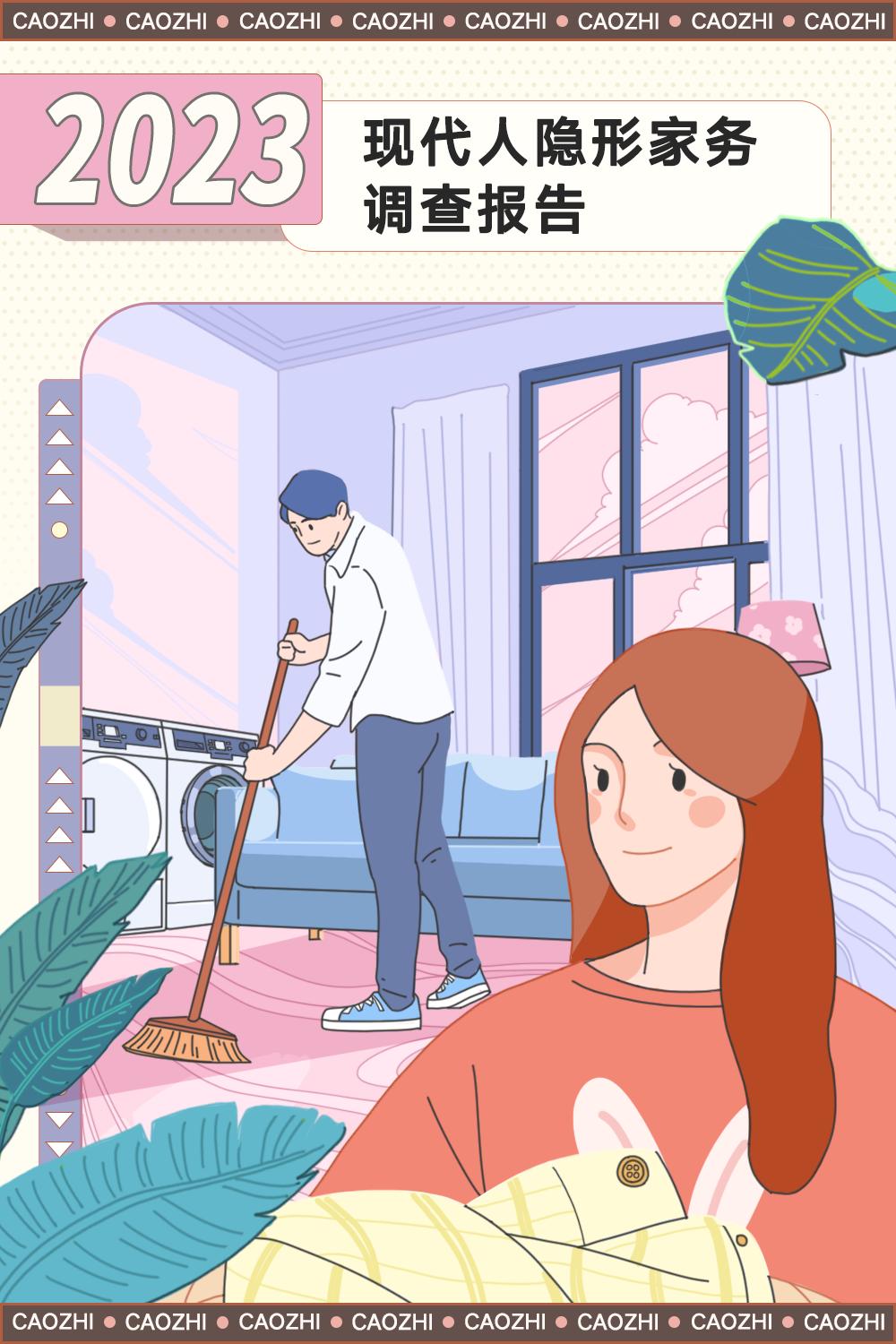
"Why do family affairs without names become my work?"
In the animated film Crayon Shinchan, the words of Mama Meiya, which revealed the truth about invisible housework, expressed the voices of countless people.
Different from routine housework such as laundry and cooking, invisible housework is often not named, but it takes a lot of time and energy and has to be done.
Dust at the bottom of the sofa should be cleaned frequently, hand sanitizer and toilet paper should be updated in time, and family seasonal clothes should be washed, aired and stored …
Because it is relatively trivial and tedious, the time and energy spent on invisible housework are often ignored.
When people talk about invisible housework, they always involve topics such as giving, quarreling, value, distribution and helplessness. Some people call it "making a mountain out of a molehill", while others urgently say that "its value should be taken seriously".
We launched the "2023 Modern Invisible Household Survey" and invited 5210 adult men and women to participate in it. The following are the attitudes of TAs.
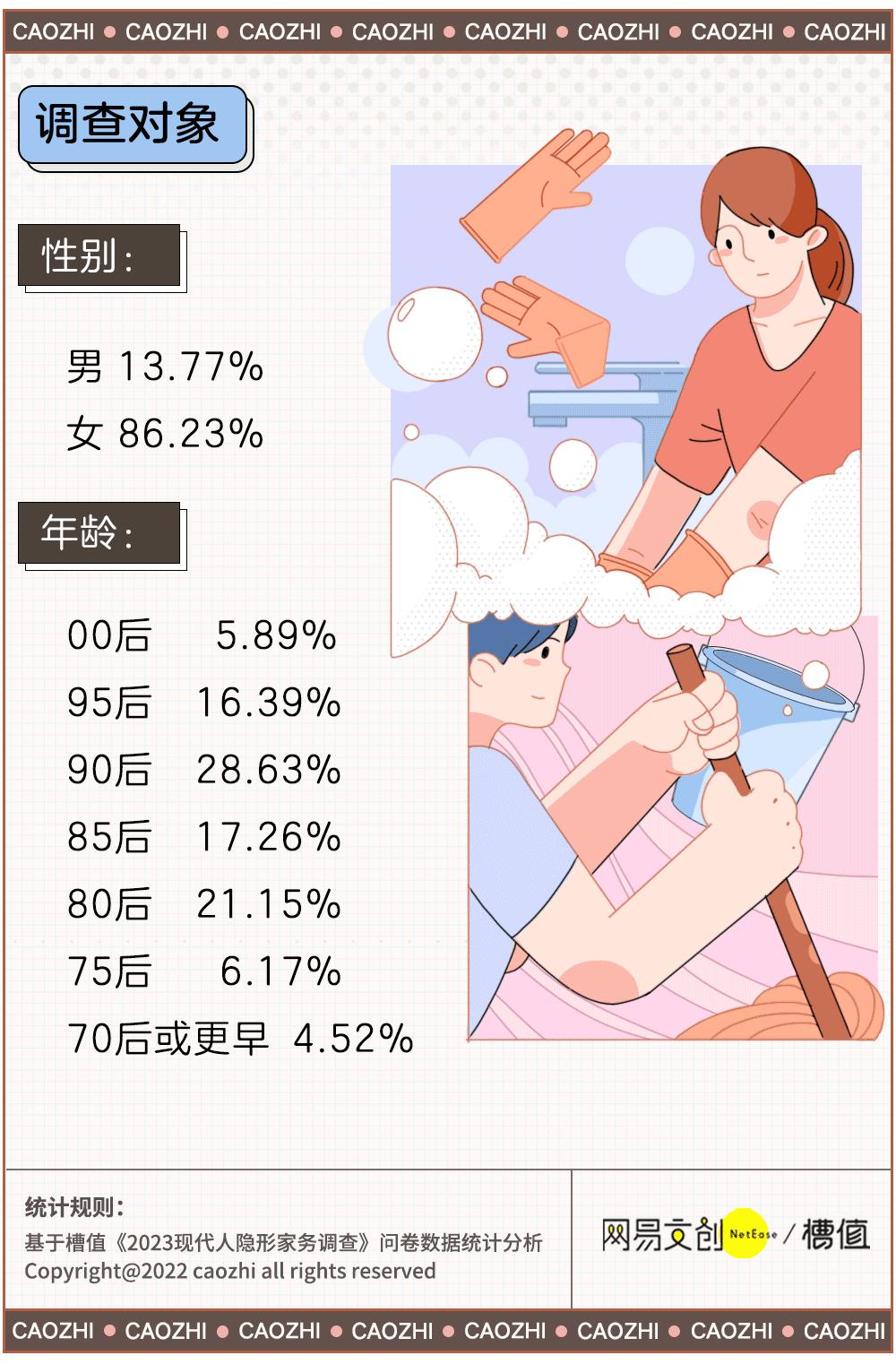

Women who think housework can’t be done at all,
Nearly three times that of men.
"How long does it take to do housework before you can have a clean and complete home?" On social platforms, the discussion about housework is very popular.
In the survey, we found that there are obvious differences between modern men and women on this issue.
Nearly 60% of men think that a family’s housework needs "2 hours or less" every day;
Women don’t agree with this: less than 40% think that they can finish housework in "2 hours or less" every day.
What is the general attitude of women towards the time-consuming problem of housework?
The answer was revealed: the number of women who "feel that housework can’t be finished at all" was the highest, reaching 24.82%, nearly three times that of men (8.37%).
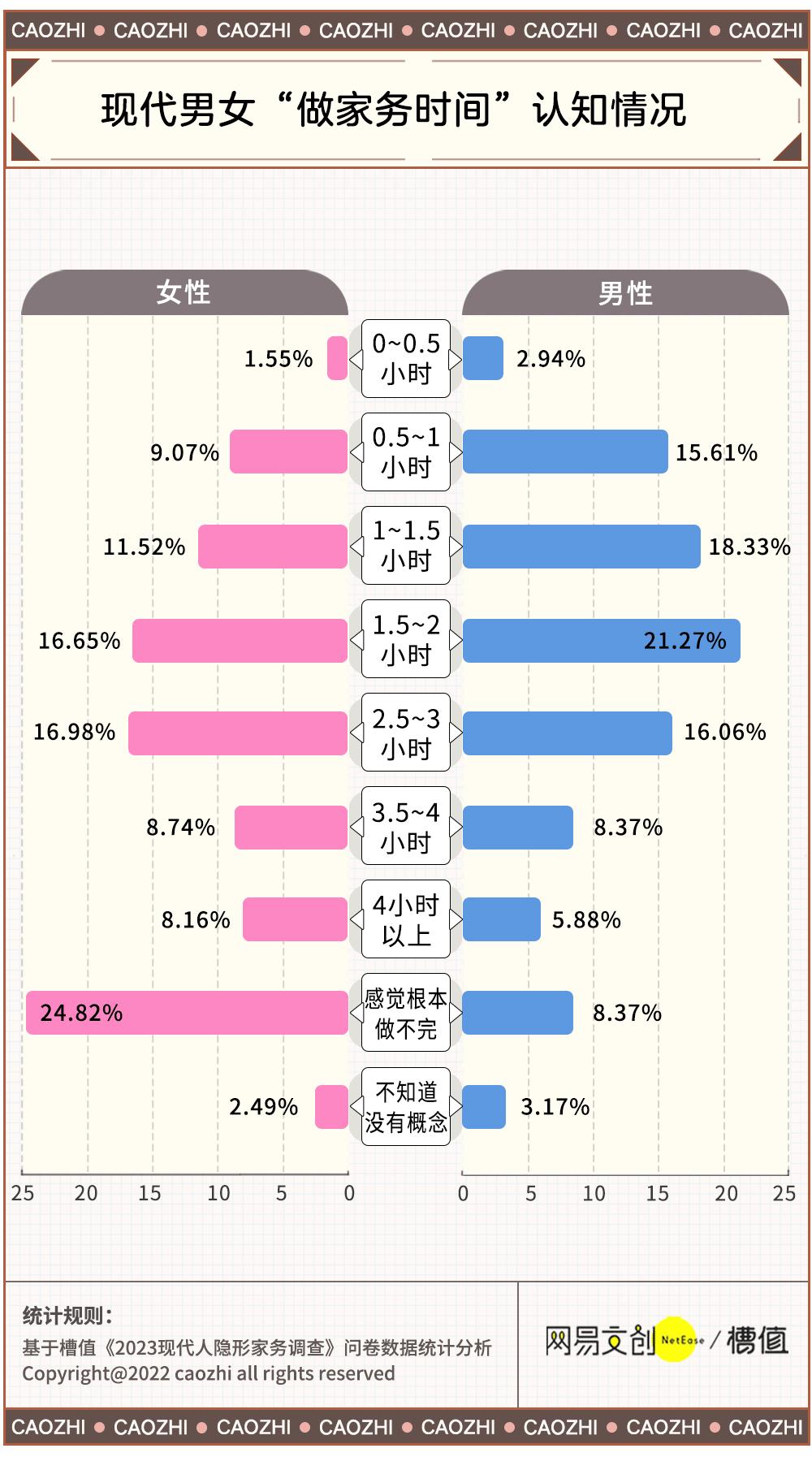
Apart from men and women who live alone, "married women who live with their partners and children" do the most work, and more than half of them say that "housework is almost done by themselves".
An interesting phenomenon is that male friends often don’t apply this rule-
Among those who never do housework, "unmarried men living with their families" accounts for the highest proportion, followed by "married men living with their families".
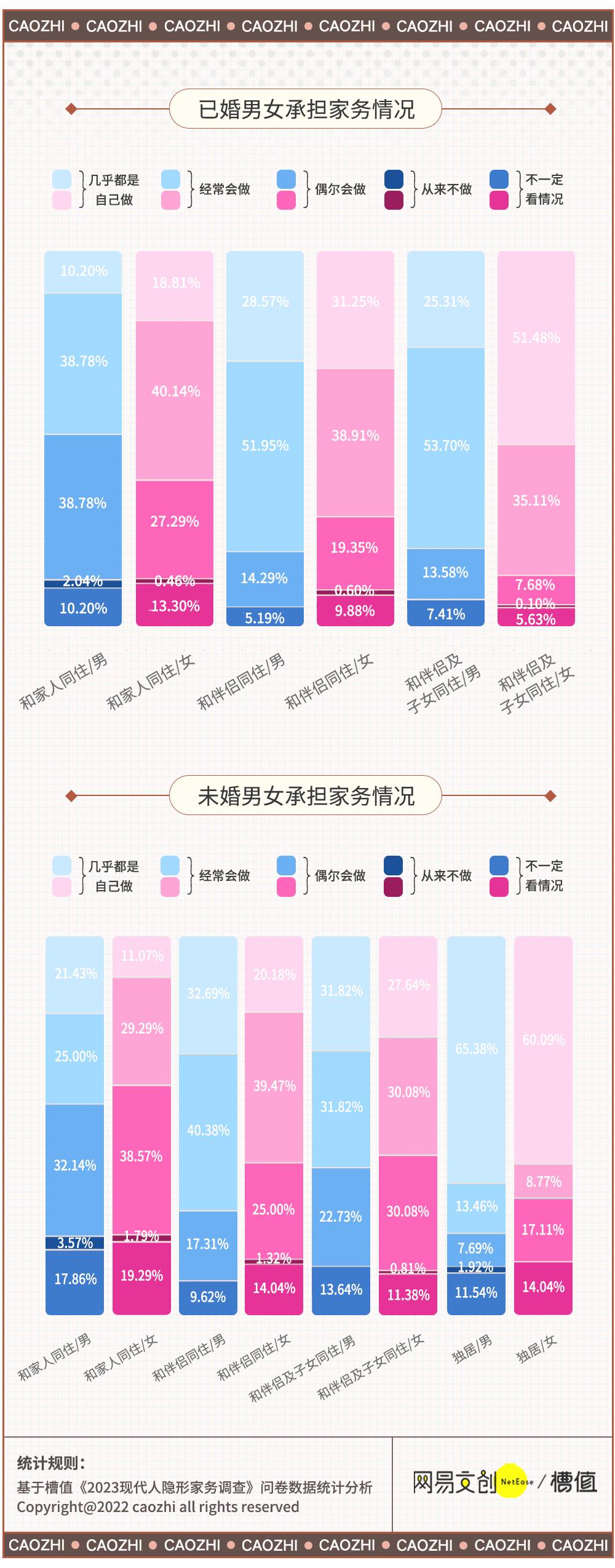
On the whole, "married women" undertake more housework than "unmarried women" and "married men" undertake less housework than "unmarried men".
This situation also has clues in the keyword "housework undertaker".
In addition to "self/me", most people mentioned female elders such as mother and mother-in-law.
35.07% of men hold the view that "the housework is almost the same at home", while only 22.43% of women have the same idea.
In addition, the number of men who choose "I don’t know or haven’t noticed" is 1.6 times that of women.
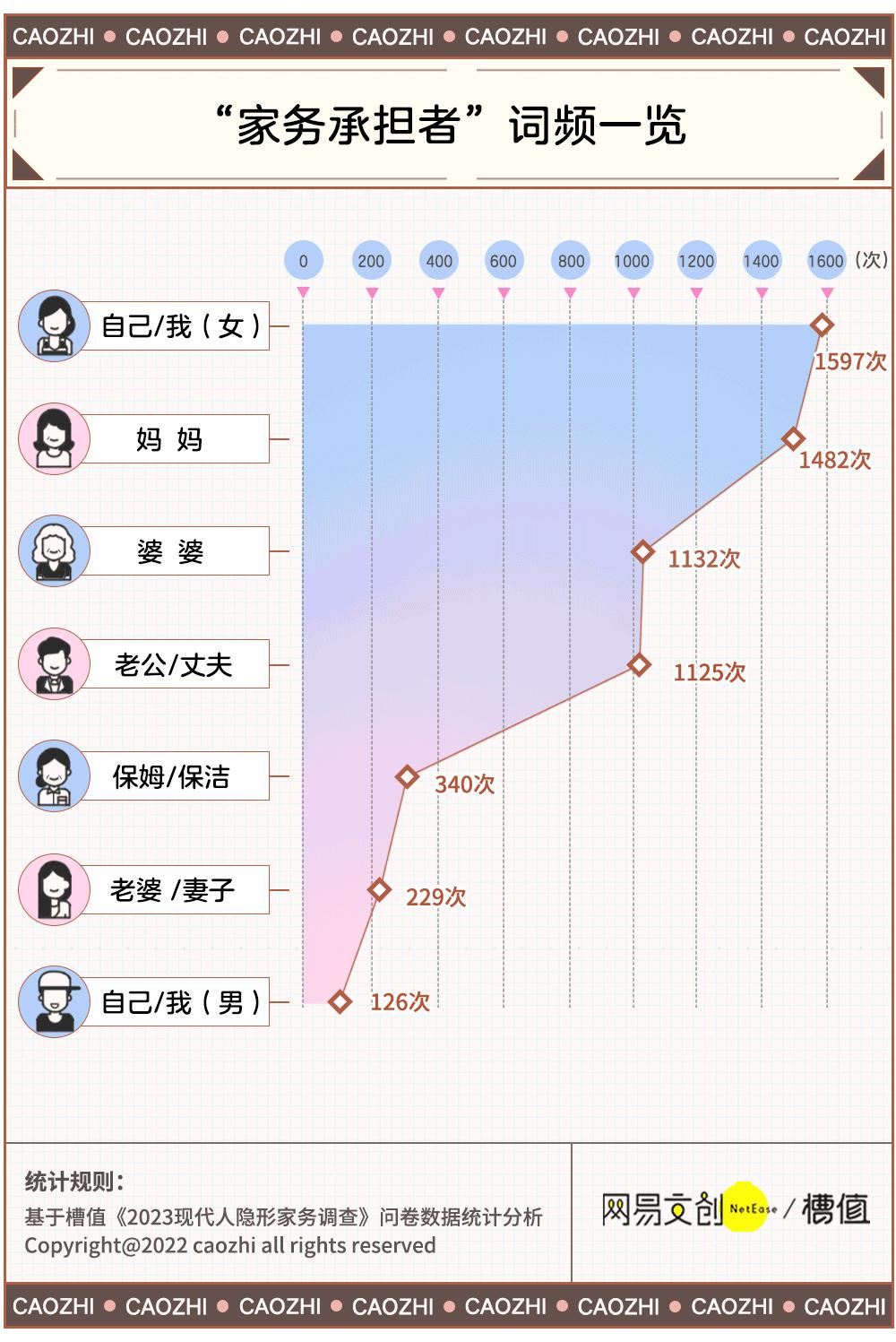
Similar phenomena are not rare.
According to the fourth survey of women’s social status in China, the average total working hours of working women are 649 minutes, of which 495 minutes are paid.
At the same time, the time for women to take care of family members and cook/clean/do daily shopping is 154 minutes, which is about twice that of men.
Not only that, as netizen @ Qingshan shared: Many women in the workplace have to take care of housework after work.
According to the survey, 76.1%, 67.5% and 63.6% of children aged 0-17 in China are mainly taken care of by their mothers.
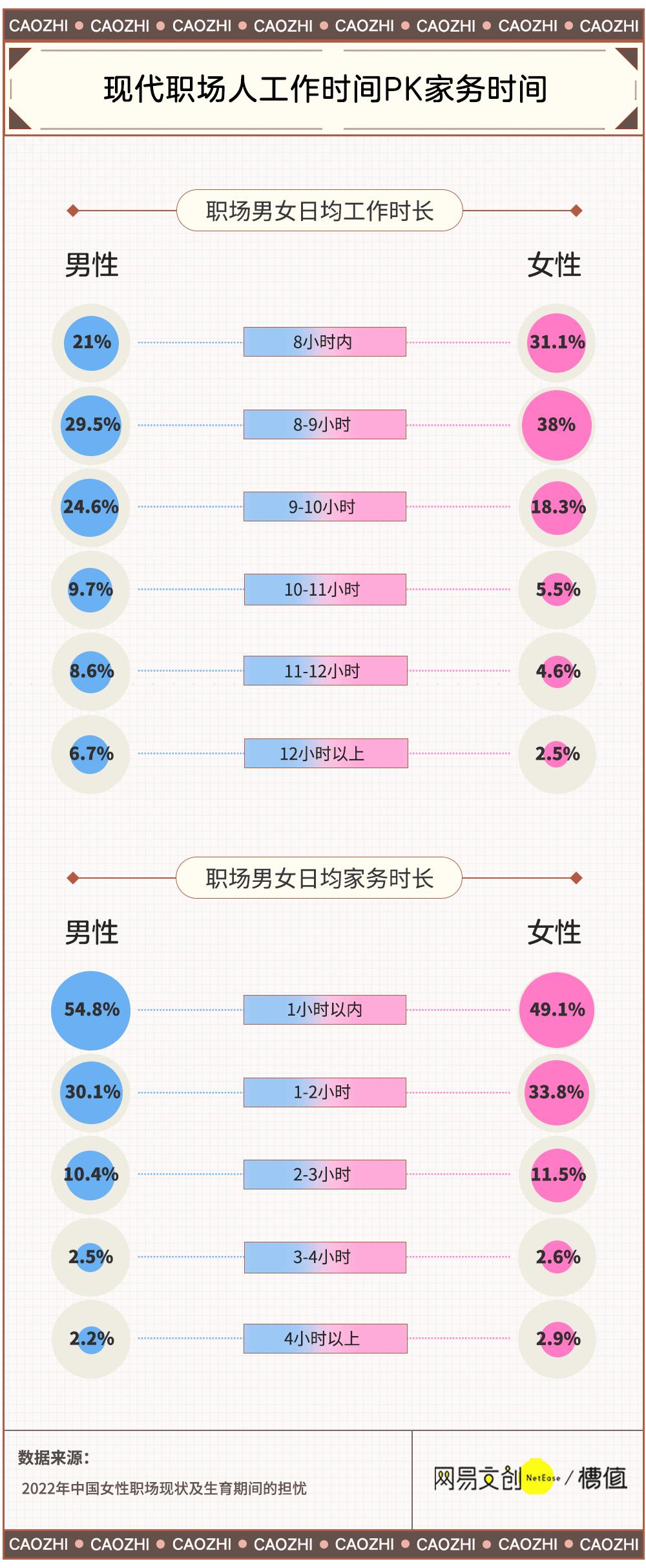
However, as more and more young people form families, TAs tend to reach a consensus on housework:
If you can’t decide on housework, look for cleaning.

Modern people’s attitude towards housework focuses on "forbearance".
Sweeping robots become the most popular "little helpers"
For modern people, doing housework is more like "passive trigger skills"-
The opportunity for over 8 adults to do housework is "unbearable", while 5 adults are "helpless".
It can only be said that the legendary "who works more depends on who can’t stand it" does apply.

Although we always talk about "who wants to do housework", 20% of our friends in the survey said: I like it!
TA people enjoy the state of doing housework, feel decompressed, and like the feeling of restoring cleanliness and order.
Of course, "I don’t want to do it" is in line with the aspirations of more people. In the selection of "favorite housework", the answer of the highest vote is concise: no, no.
In particular, the attitude towards "cooking" fully confirms the phrase "honey of A is arsenic of B"-
In the most annoying and favorite housework PK, cooking is on the list.
After 00, the little friend @ 京京京京京京京京京京京京京京京京京京京京京京京2014 Buying food, preparing food, cooking and washing dishes are not very good.
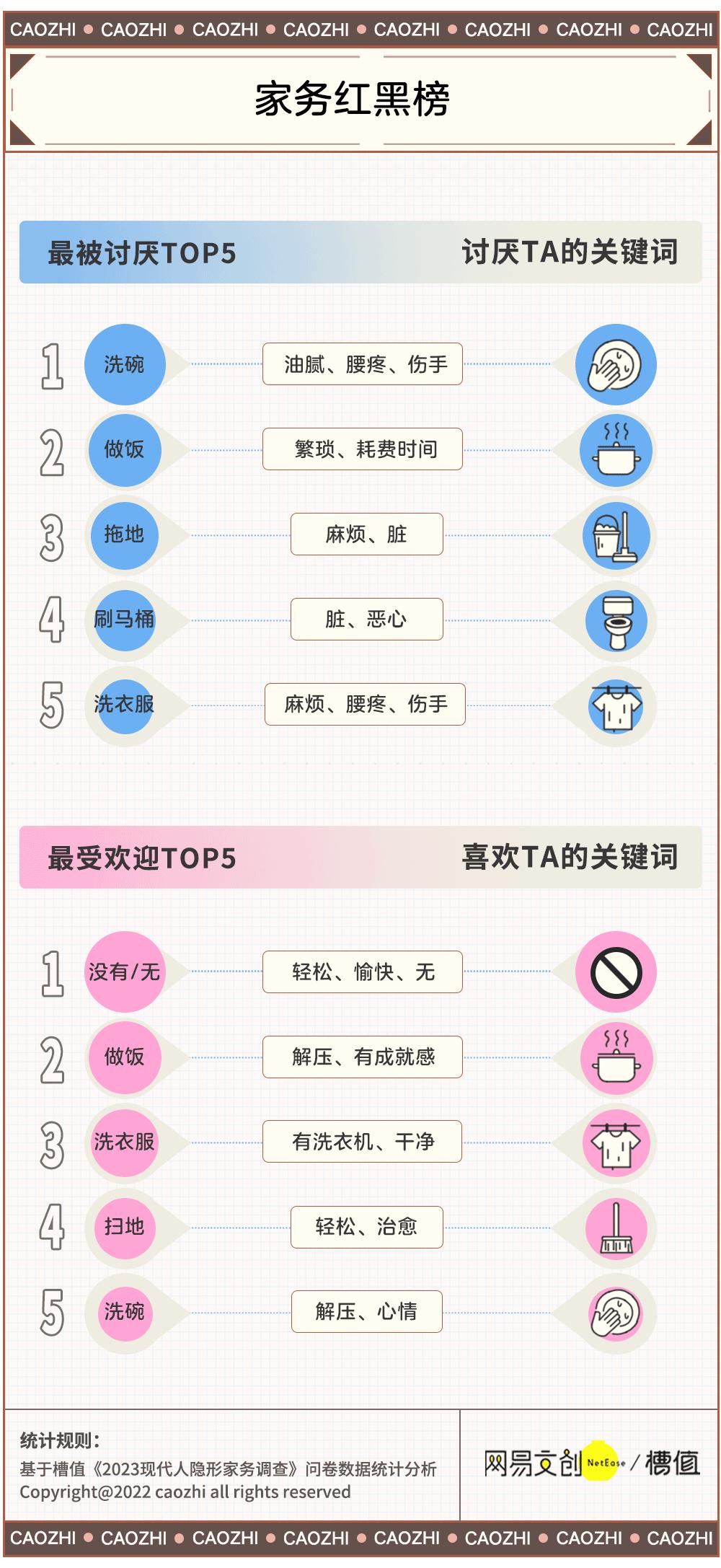
Life and work are stressful, and trying to "free your hands" is the right solution rather than enduring pain-
More than 7 adults said that they or their families had purchased related electrical appliances.
Among them, the most recommended and used are: sweeping robot, dishwasher and vacuum cleaner.
Netizen @peanut Passion Amway: sweeping robot, dishwasher, electric lifting clothes dryer and air freshener, four great inventions of invisible housework.
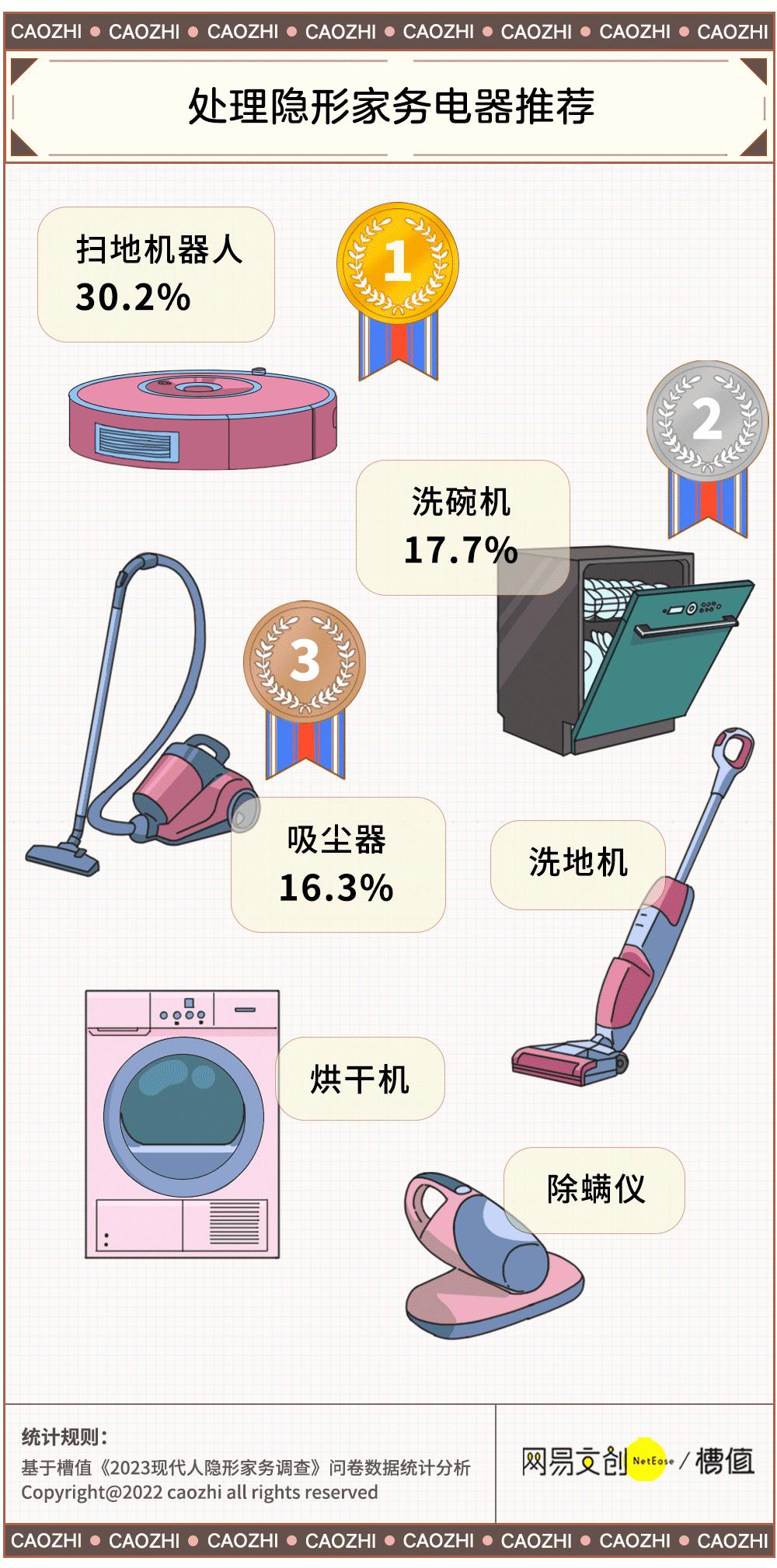
However, don’t accept Amway yet.
Many domestic experts shared their experience with us: sometimes electrical appliances may bring new problems.
"Sweeping robots and vacuum cleaners themselves need to be cleaned" and "Dishwasher washes dishes, I wash dishwashers" are the hardest hit areas, and other troubles may follow-
"The family feels useless."
"With tools, doing housework has become a matter of course."
"The more you buy, the more chaos at home."

Adult’s housework experience:
There are thousands of housework, and "children" account for at least half.
Although people pay more and more attention to gender equality and housework distribution, most families in China are still more traditional in housework distribution.
Women have done more work in washing/ironing/storing/drying clothes, buying food, cooking and taking care of children.
Men are more responsible for washing dishes, sweeping/sucking floors/mopping floors, taking out garbage, repairing electrical appliances/furniture, and taking care of their partners/elderly people.
The gap in "storing clothes" is particularly obvious: the proportion of men who have done this housework is 6.5%, while that of women is 90%.
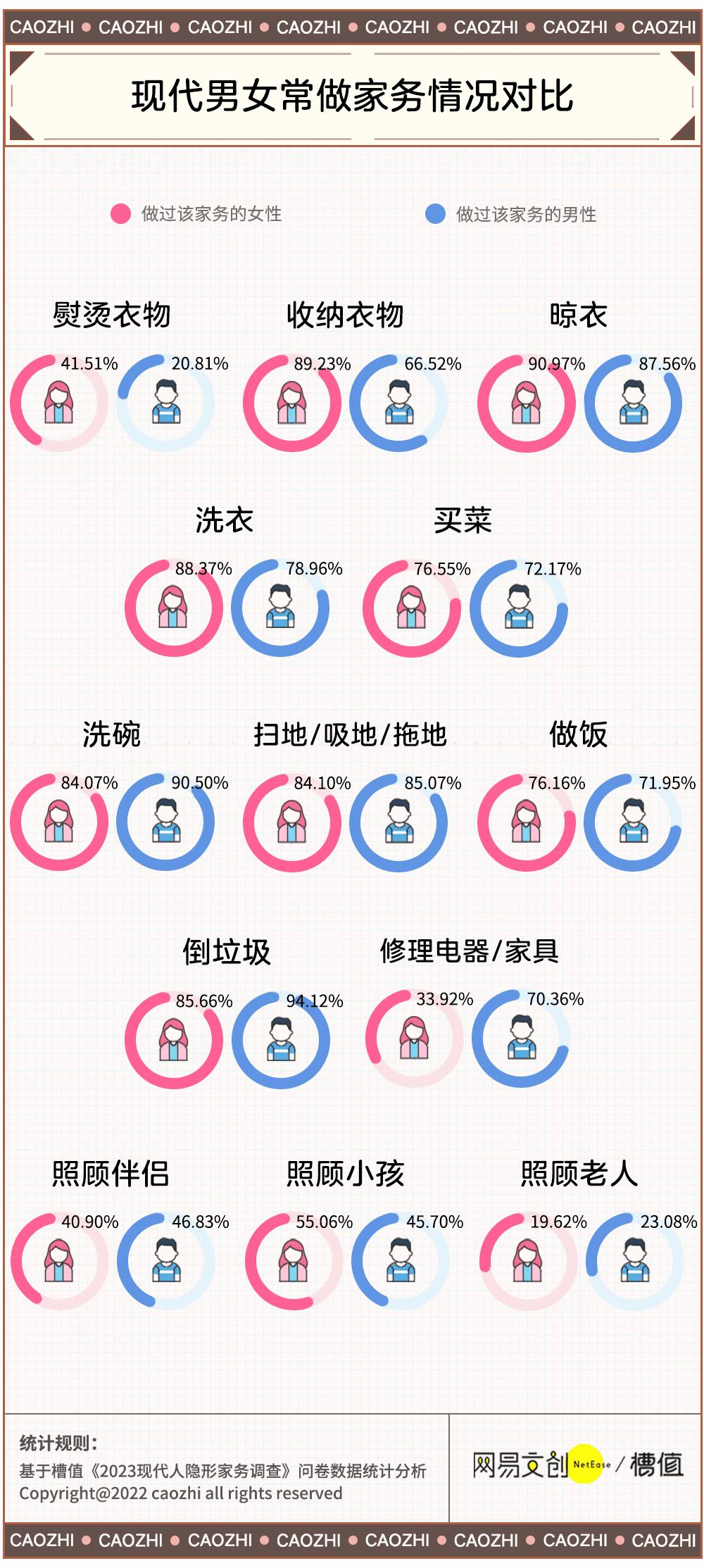
The biggest difference between men and women who often do invisible housework is "tidying up the wardrobe in different seasons", with a gap of 34.25%.
In most families, the person responsible for answering "Where did you put the down jacket last winter?" and "What about my short sleeve last summer?" is a woman.
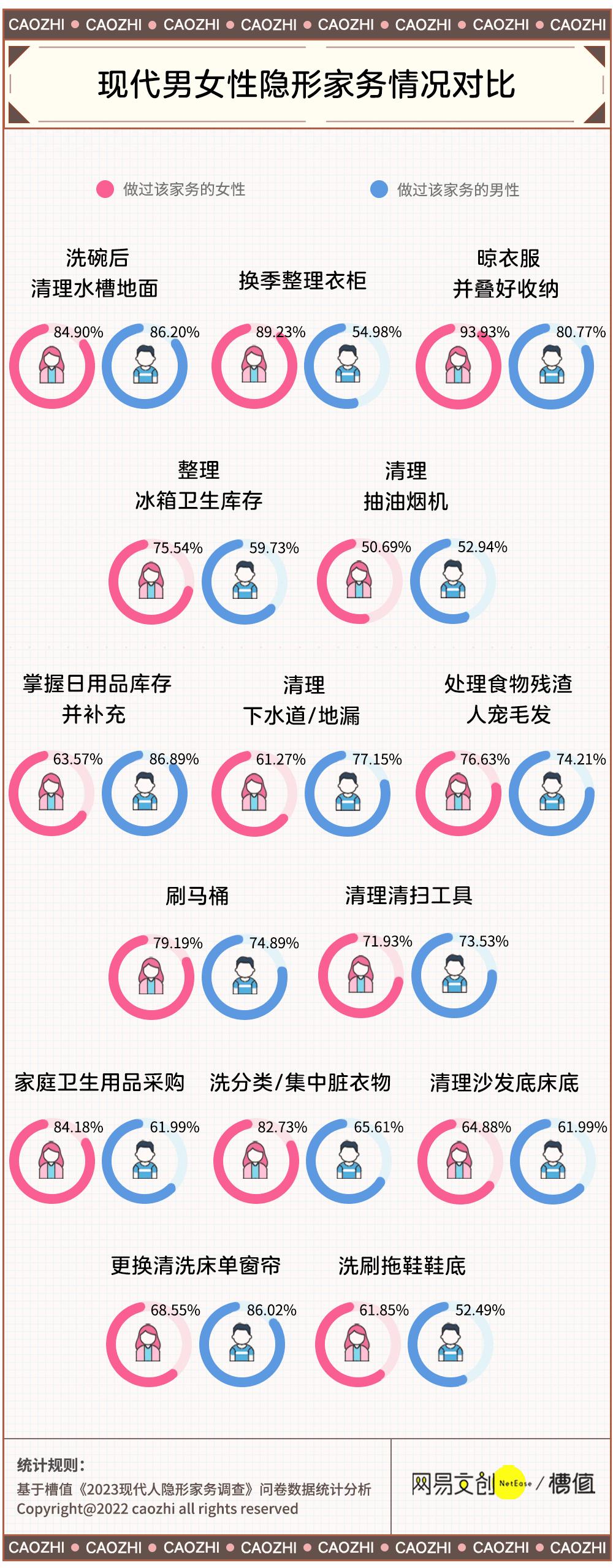
"There are millions of invisible housework, which can’t be finished in three days and three nights" is the common idea of this generation of adults.
Among the "invisible housework" added by everyone, the most frequently mentioned keywords are:
Children, baths and pets.
For the sake of children and hairy children, it may be used to summarize the lives of most adults.
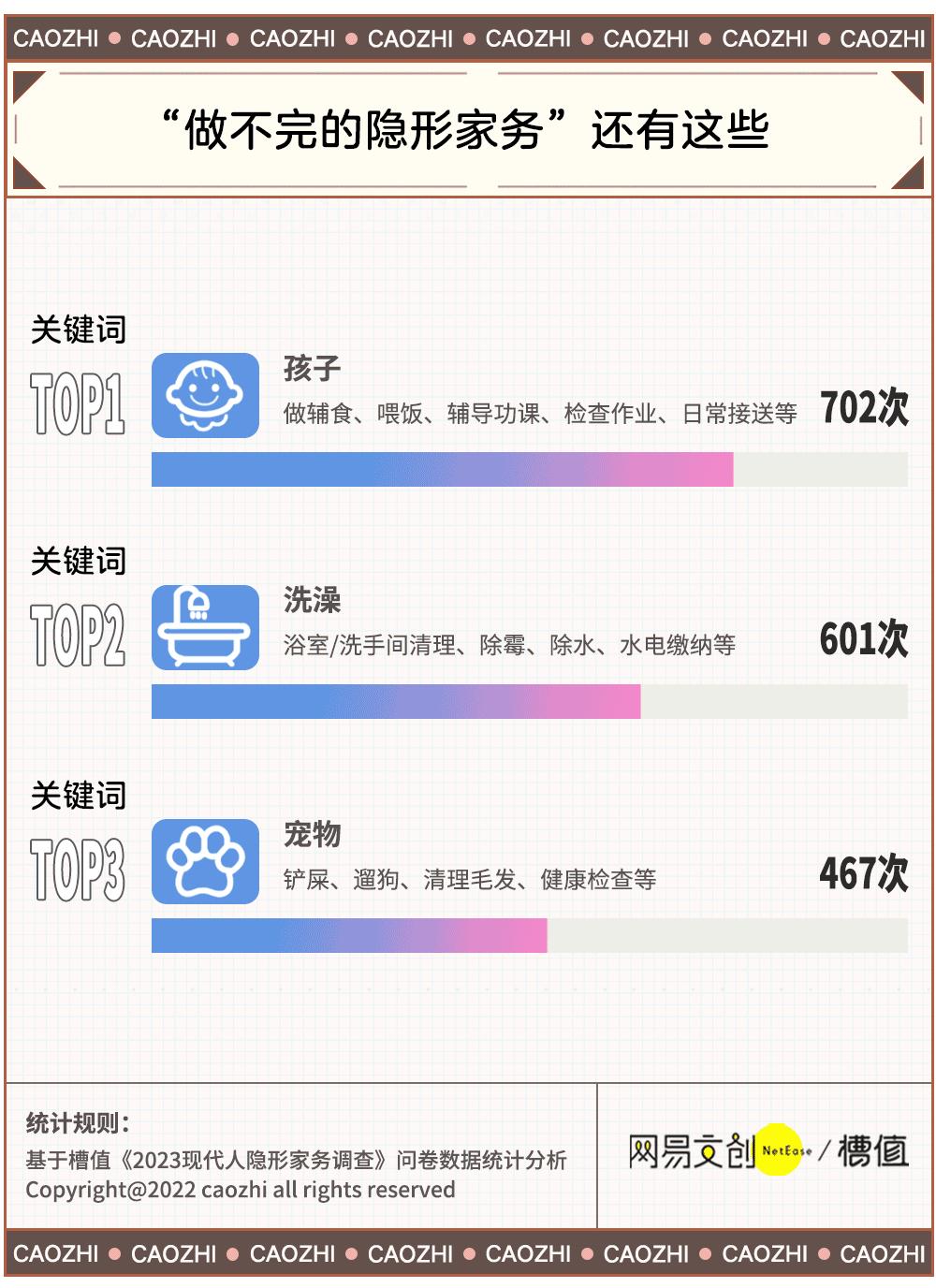
The housework related to "bathing" is the most unexpected detail that everyone adds.
Netizen @ hakimi explained: It may involve helping children and the elderly to bathe, transferring and returning toiletries, removing mildew and wiping, scrubbing the floor and so on.
Children’s related housework is "an iceberg hidden under the water".
Children should wash bottles, wash toys, make complementary food and sleep when they are young; When children grow up, they should check their homework and prepare clothes for various courses …
The novice mother @Lynn mentioned: "Many mothers have heard the phrase" You will rest when your child sleeps "; But I don’t care, even if the child is resting, it is difficult for the mother to stop. "

Housework has a greater impact on women,
"Giving is not recognized" is the most maddening.
Affected by children, housework and other reasons, more than 30% of women said that their income has decreased.
Promotion, further education, promotion and other benefits are also "heavy losses".
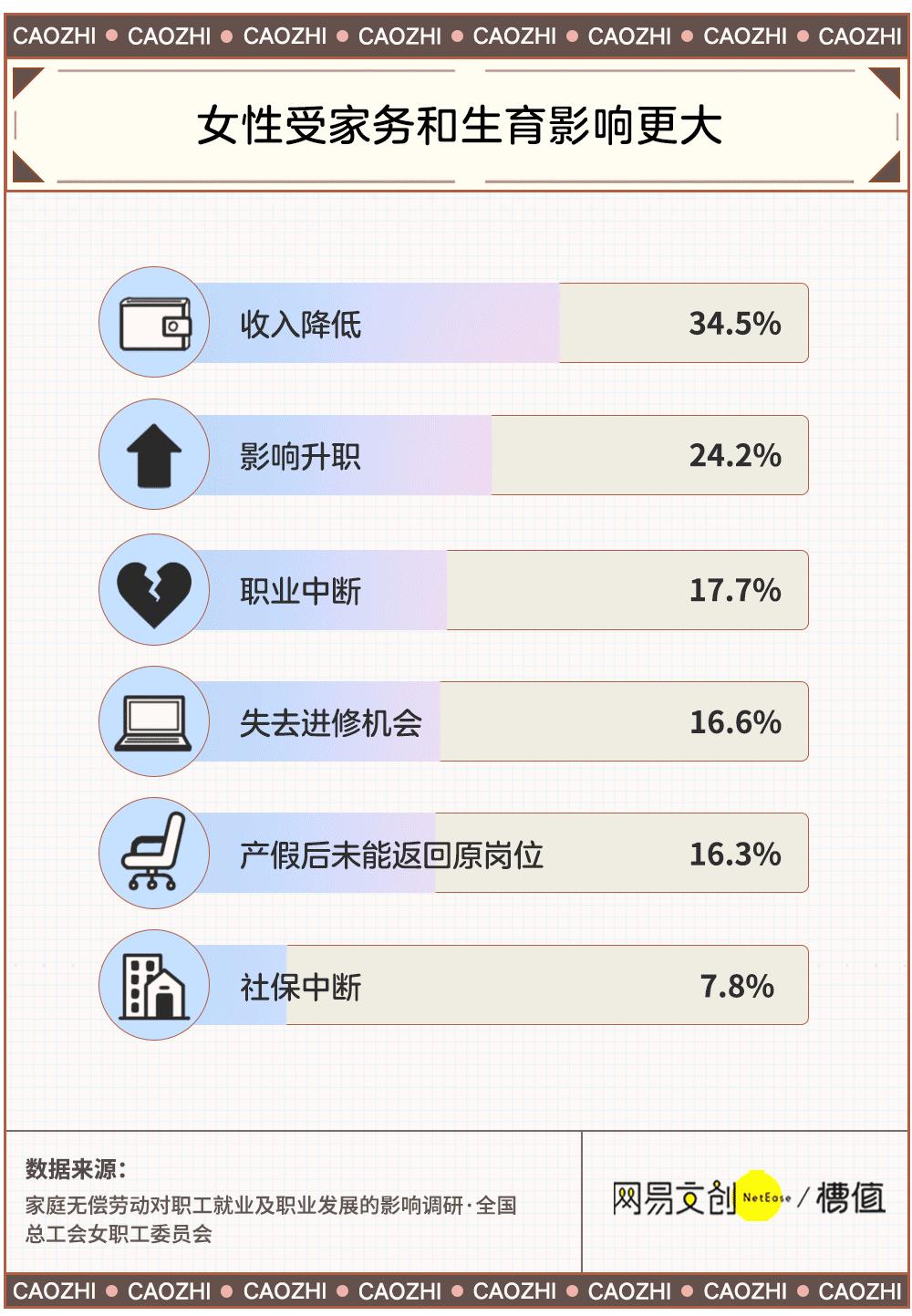
Regardless of men and women, the biggest emotional trouble brought by housework is: the inequality between time and energy and the sense of gain.
Nearly 80% people feel that they are squeezed by housework for a lot of time and energy;
Family members do not cooperate, do not recognize, or even destroy, which makes people feel helpless, angry and collapsed.
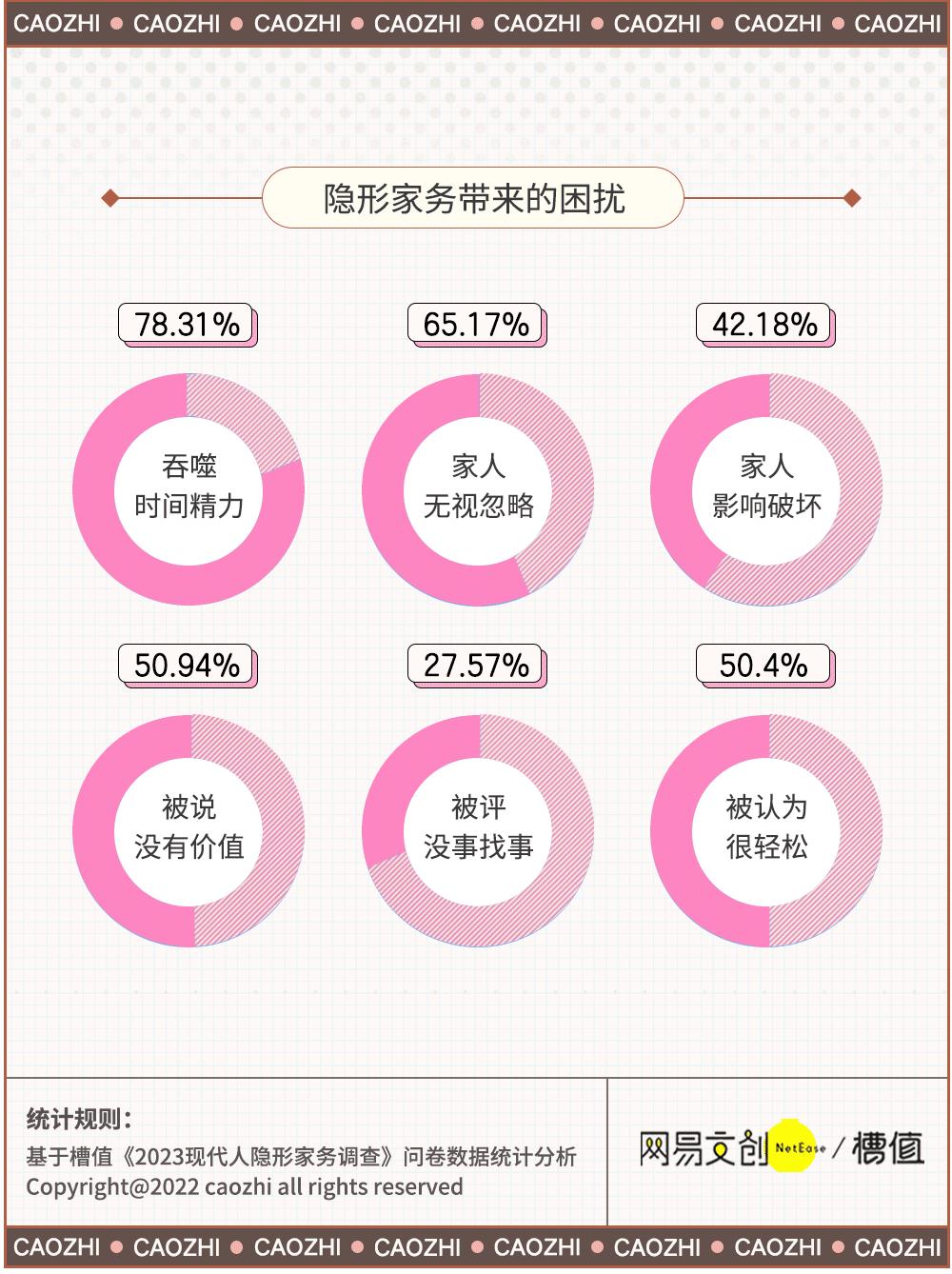
Among the troubles about housework, one word is frequently mentioned: powerlessness.
"I tried my best, but I didn’t change it." "I promised to do it, but I always scribbled to deal with it." "I have to rework it when I finish it."
People who do housework are not only afraid of "not knowing the darkness at night during the day", but also "only themselves want to change from beginning to end"
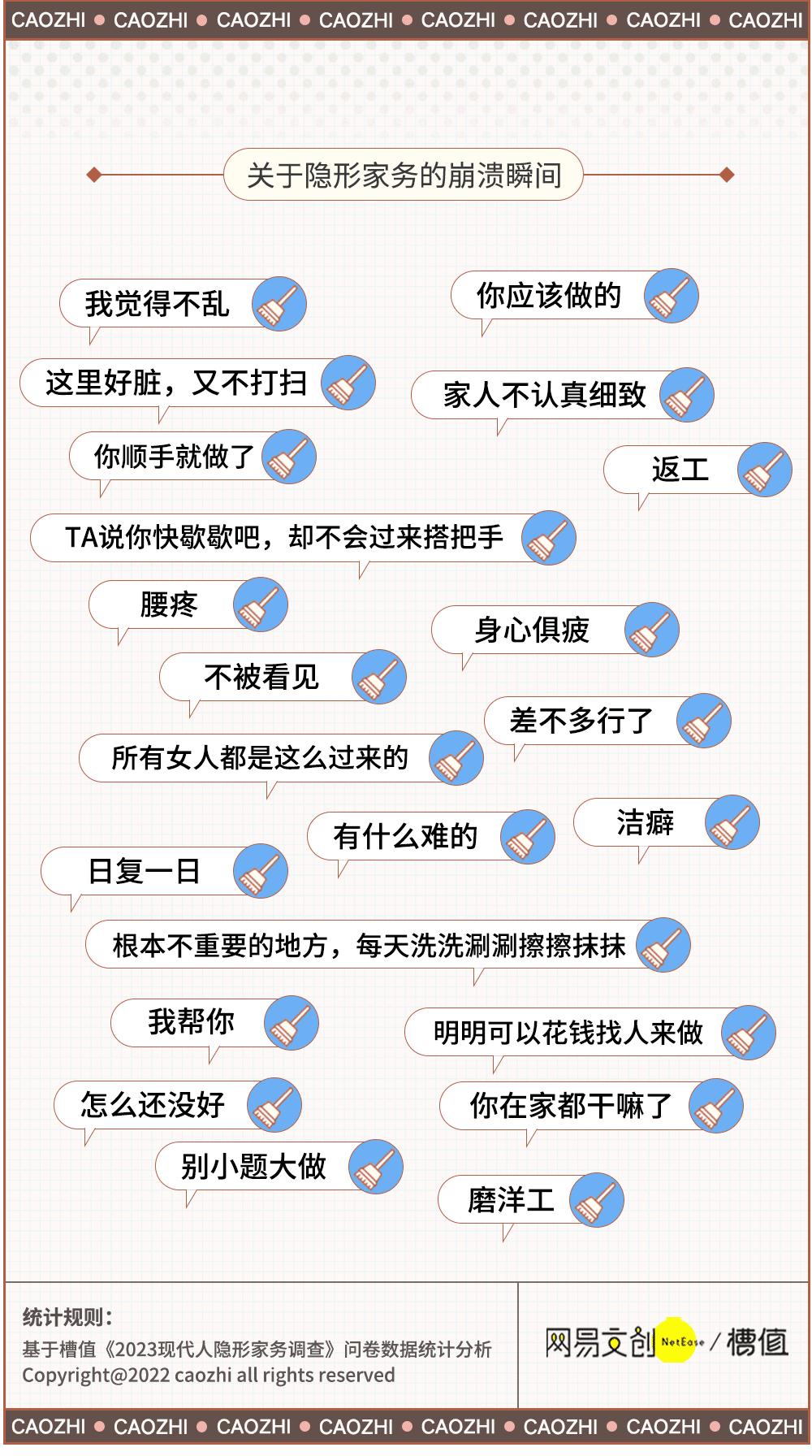
"The housework is too complicated, the cutting is constant, and the reason is still chaotic."
Someone once suggested that "people who do housework should be paid a certain fee", and we also collected your opinions-
Among nearly 70 adults who choose "should", the proportion of women is 72.15%, while that of male friends is only 34.16%.
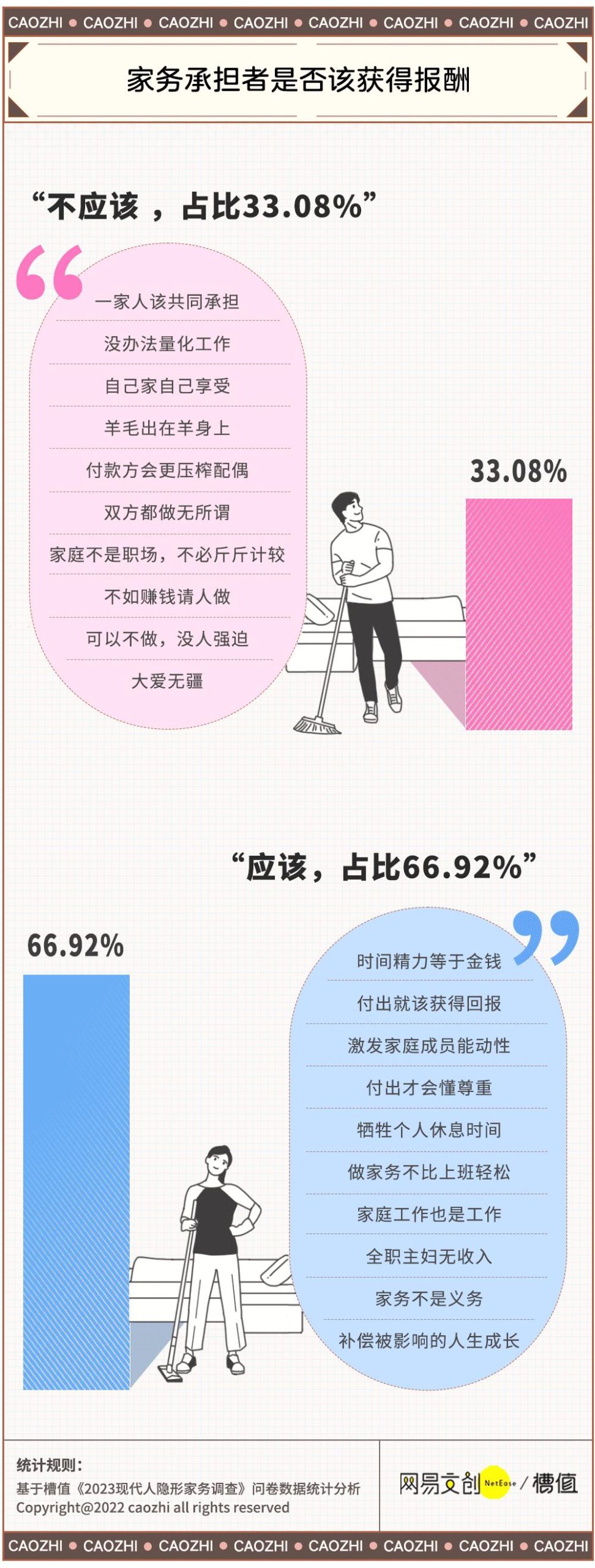
Differences in ideas and attitudes have led to quarrels. Seven adults revealed that there had been disputes and discussions about housework.
At the same time, nearly 6 adults said that quarreling did not solve the problem.
Disputes, cold war, breakup and divorce, after trying various schemes, many people, such as netizen @ hedgehog’s summer, can only sigh helplessly: housework is the hidden love killer.
Among those who "have never quarreled because of housework", the most common reason is that some people silently undertake, hire a nanny/cleaner, and share it equally.

TA’s suggestions on "invisible housework"
Who should do housework in a family?
Some people say that "men are careless and women are careful and suitable for housework" (we also launched a survey on this statement, and finally got some beautiful but not suitable words);
Some people also say that "a family doesn’t have to be so clear about who is doing it or not."
But in the long run, housework will inevitably become someone’s "obligation": one party has long been unable to face up to grievances and anger because of personal efforts; The other party’s business is irrelevant and hangs high, further intensifying contradictions.
How to change this situation? The TAs also gave their own suggestions.

For your answers, we also summarized the following key messages-
1. Avoid interference and substitution by elders.
@ Sweet Potato: When I live with my husband and children, my husband can still do a lot of housework after work. Since the mother-in-law came to take care of the child, she would silently do it for her or forbid him to do housework. It is easier to break the rules than to establish them.
2. Refuse to beautify housework as "obligation" in the name of love.
@ Rong: The husband and wife do it together, and whoever has time will do it. Life is hard enough, so don’t be internal.
3. We should also stress principles and stand firm on housework issues.
@ Yangyangyang: It is natural for one person to finish housework actively after the quarrel. In the long run, the problem will be more serious.
4. Don’t shy away from discussion and argument.
@ 芺?: Don’t give up because the quarrel is fruitless and the results are hard to maintain. The quarrel/discussion is essentially a communication. If you want to solve the problem, you must first ask the question.
5. Develop daily habits and start from "small"
@Fay: The previous generation of women did not think deeply, and this generation of women began to think deeply; What I can do is to educate boys to take on housework. Of course, this is a new housework.
-Write it at the end-
Thanks to all the friends who participated in the survey for providing us with real data and feelings.
Life is always a chicken feather, but it always has different ways to pick it up.
In the second half of the chapter on obscure family affairs in Crayon Shinchan, dad Hiroshi asked himself: Why can’t such a simple thing be done? Why?
How to thoroughly solve housework problems and the troubles caused by housework problems? As the old saying goes, "Honest officials can’t break housework", and housework problems in daily life can’t be avoided, and they can’t escape.
For all of us, what we can do may be to change the subconscious mind that housework belongs to those who can’t stand it, that housework belongs to those who have a living eye and that I’ll help you do it.
With housework, there is a home;
Instead of "having a home, there will be endless housework."
Original title: "Cohabitation is the collapse of the house, what murdered my love? 》
Read the original text












































